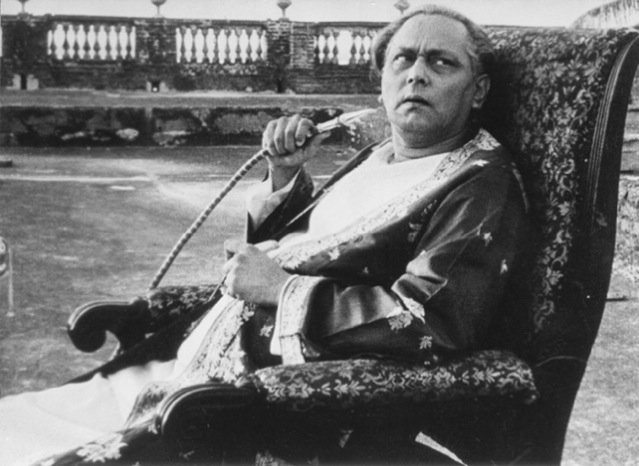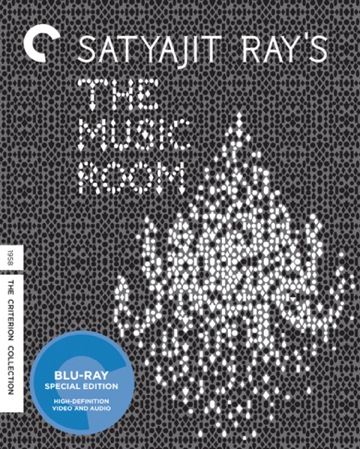CHICAGO – Patrick McDonald of HollywoodChicago.com audio review for the doc series “Charlie Hustle & the Matter of Pete Rose,” about the rise and bitter fall of the major league legend, the MLB’s all-time hits leader, only to be banned from the sport because of gambling. Streaming on MAX and on HBO since July 24th.
Blu-Ray Review: Satyajit Ray’s ‘The Music Room’ Gains New Life on Criterion
CHICAGO – In between the second and third installments of his infamous “Apu Trilogy,” Bengali master of cinema Satyajit Ray made two films that were striking departures from his signature portrait of poverty-stricken youth. The first was 1958’s failed comedy “The Philosopher’s Stone” (sorry, Potterheads, no relation) and the second was 1959’s masterpiece, “The Music Room.”
This landmark classic is brought to electrifying life by Criterion’s magnificent digital restoration. The renewed picture quality allows Ray’s elegant visual poetry to be savored like never before. Without changing locations or resorting to heavy-handed symbolism, Ray is able to explore the decline of feudalism by depicting the life of a once-wealthy aristocrat whose bloodline is literally washed away by the ever-encroaching waters of the Ganges.
 Blu-Ray Rating: 5.0/5.0 |
Unlike Indian filmmakers of the day, Ray sought to integrate action and music into his narrative rather than feature them as separate entities. Music plays a crucial role in the life of Biswambhar Roy (beautifully played by Chhabi Biswas), a feudal landowner who’s spent a great deal of his fortune on live entertainment held in his titular room. Much of the picture’s first act plays out in flashback, as Roy holds a lavish party for his son’s initiation ceremony. He can’t contain his cheerful excitement while confessing to his tearful wife that he mortgaged her jewels to pay for the performance of a high-class singer. Yet when his family dies in a sudden cyclone, Roy is reduced to a hollow shell of a man, haunting his empty mansion as if he were a ghost. The film cuts to several years later, as the modern world begins to intrude upon his isolated life through the buzzing of nearby “electric machines” and the jubilant festivities celebrated at the house of Roy’s discriminated neighbor, Mahim Ganguly (Gangapada Basu, looking vaguely Chaplinesque), a self-made landowner with a heartlessly cruel streak. It’s midway through the picture that Roy finally forces himself to descend his staircase and open the door to his past.

Chhabi Biswas stars in Satyajit Ray’s The Music Room.
Photo credit: The Criterion Collection
The centerpiece of the film’s final act is a spectacular Kathak dance performed by the renowned Roshan Kumari that causes the viewer to become as entranced as Roy by the magic unfolding before him. The camera is often perched above the seated listeners in Roy’s music room, allowing the atmosphere of the space to be conveyed through the juxtaposition of entertainer and audience (in a typically exquisite detail glanced through a mirror, a servant is seen cooling the crowd with an enormous fan). Ray and his invaluable cinematographer, Subrata Mitra, find ingenious ways of visualizing the aristocrat’s predicament through straightforward observations, such as the way Roy’s elephant is obscured by the cloud of dust left by a passing car. Through his impassioned study of foreign filmmakers, Ray gained a vast knowledge of cinema unequaled by his peers, and emulated it in his own distinctive work, thus making his own culture universally accessible to moviegoers for perhaps the first time in history. He is truly one of the greatest filmmakers in the history of the medium, and “The Music Room” is a priceless gem practically begging to be rediscovered. Now that Criterion has proven it can reinvigorate Ray’s vital work, I suggest that the company concentrate its efforts on releasing the ideal edition of “The Apu Trilogy.”
 The Music Room was released on Blu-Ray and DVD on July 19, 2011. Photo credit: The Criterion Collection |
“The Music Room” is presented in 1080p High Definition (with a 1.33:1 aspect ratio) and includes several extras that provide remarkable insight into the mind of Ray. In a fascinating 17-minute interview, biographer Andrew Robinson recalls his various conversations with the director, who admitted to him that, “music is more important to me than cinema.” The project was originally spawned from Ray’s need for a box office hit, though the film ended up faring even better with western audiences. Robinson reveals that in Tarashankar Banerjee’s book (which served as the film’s source material), cholera ends up killing the aristocrat’s family, though Ray felt that the freak storm (and Roy’s guilt over the circumstantial tragedy) would make the film more psychologically interesting. Since Biswas was tone deaf, Ray had to direct his expressions and body language in order to convey that he truly understood the music that was playing. This results in moments of masterful subtlety, such as when Roy lifts his finger in order to mark the rhythmic cycle of sixteen beats. “Monsoon Wedding” director Mira Nair also gives a heartfelt interview where she cites Ray as her “greatest teacher in how to use music in film.” His work was so obscure that she hadn’t discovered it until she came to America for college. Nair also highlights some of the major Indian performers seen in the corners of the frame, such as Begum Akhtar and Bismillah Khan.
In a 1981 roundtable held in honor of “Music Room”’s French theatrical release, Ray is joined by filmmaker Claude Sautet (who praises the film’s simplicity) and critic Michel Ciment (who mistakenly praises Ray for writing the score). Ray claims that he made the picture with no thought of foreign audiences and was surprised by how the west had embraced it. Around the same time as the roundtable, filmmaker Shyam Benegal began shooting extensive interviews with Ray, while capturing candid footage of the director at work on the set of his 32nd feature, “The Home and the World.” Benegal later edited the footage into his 131-minute documentary, “Satyajit Ray,” which is included in its entirety on the disc and is an absolute must-see for film buffs eager to learn more about the groundbreaking artist. Speaking in marvelously eloquent English, Ray shares vivid memories of his upbringing, his multiple criticisms of early Bengali films, and his favorite foreign films that gave him inspiration (he was a particular fan of Leo McCarey’s Cary Grant/Irene Dunn comedies). There’s also some priceless clips of other period pieces tackled by the director (including “The Goddess” and “The Lonely Wife”), as well as a truly bizarre children’s film (“The Adventures of Goopy and Bagha”).
 | By MATT FAGERHOLM |


